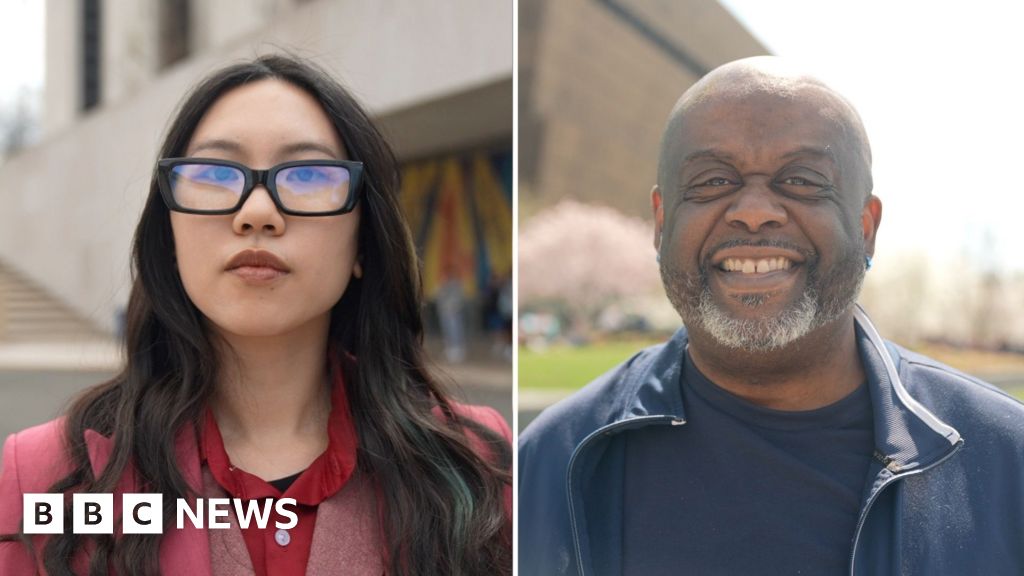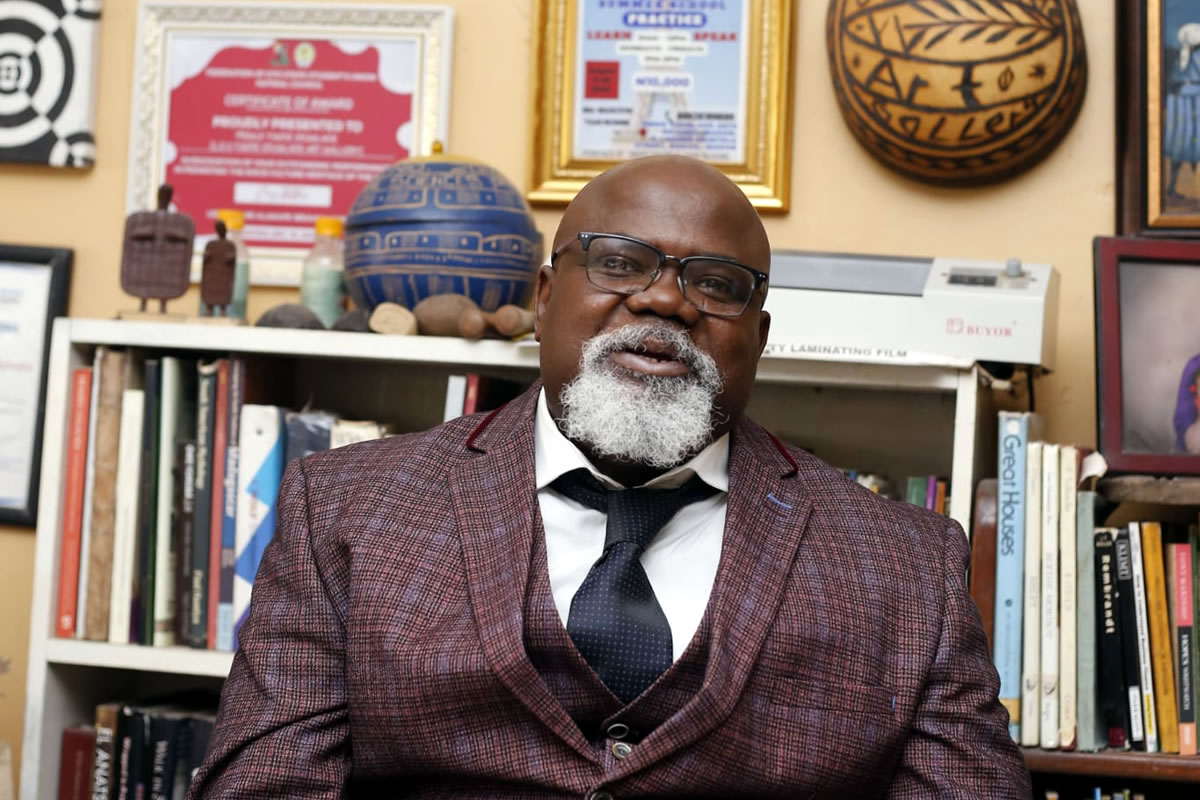- BlackVoter.Org
- Posts
- BlackVoter.Org
BlackVoter.Org


In a bold move, President Donald Trump has signed an executive order aimed at removing what he deems "improper, divisive, or anti-American ideology" from the Smithsonian museums in Washington, D.C.
The BBC visited key museums, including the National Museum of American History and the National Museum of African American History and Culture, to capture the reactions of visitors curious about this order. The question on everyone's lips? What exactly does "anti-American" mean? The responses reveal a kaleidoscope of interpretations, shining a light on the diverse opinions surrounding the concept.
As the discourse unfolds, the implications of the order raise critical conversations about freedom of expression and the role of museums in shaping national identity. Tune in to gauge the public's sentiment and get a glimpse of the current cultural climate ignited by Trump's administration.

In Dedria Humphries Barker's vibrant exploration of Black music in her article "Black Music for Sinners and Everyone Else," she dives into the pulsating heartbeat of American culture. Inspired by Ryan Coogler’s film "Sinners," she aspires to elevate the juke joint—the mesmerizing music scene that transcends time and connects us all.
She reflects on the diverse genres born from Black artistry—gospel, blues, jazz, hip-hop, and more—and how they illuminate social struggles, joy, and resilience. Barker celebrates legends like Aretha Franklin and Stevie Wonder, acknowledging their indelible impact on cultural identity.
With an emphasis on community and freedom, she highlights music's power to unite, uplift, and heal. As she reminisces about dance trends that broke barriers for Black women, Barker reminds readers that Black music isn't just a genre; it's a vibrant declaration of life, resilience, and the joy of existence.

A North Carolina Highway Historical Marker is now honoring Nancy C. Bazemore, a courageous activist who championed voting rights in the 1960s.
This recognition celebrates the landmark 1961 Supreme Court case, Bazemore v. Bertie County Board of Elections, where Bazemore bravely challenged discriminatory voter registration practices.
Represented by attorney James Walker Jr., she fought against unjust literacy tests that hindered Black residents’ right to vote, ultimately winning her case and setting a precedent for fair voter registration standards statewide.
State Rep. Rodney D.
Pierce, who secured the marker, emphasized its significance in remembering the impactful legacy of individuals like Bazemore and Walker. The Bazemore family expressed gratitude, highlighting how her defiance against systemic injustice paved the way for future generations.
This marker serves not only as a tribute to a fierce advocate for civil rights but also as a beacon of inspiration for ongoing struggles against oppression.

In "The Classical Liberal Foundation of Civil Rights," David Lewis Schaefer highlights an often-overlooked connection between classical liberalism and the civil rights movement in America. He critiques the dominant narrative that pits progressives against conservatives regarding racial justice, instead presenting Jonathan Bean's "Race and Liberty" as a vital resource that showcases classical liberals' fight against slavery, segregation, and racial discrimination.
Through 75 historical documents, Bean illustrates how figures like Frederick Douglass and the early Republicans championed individual rights, emphasizing color-blindness in law as a pathway to true equality. Schaefer argues that today’s "progressives," by promoting group rights, misrepresent the classical liberal legacy that has long advocated for race-neutral policies.
For anyone interested in the evolution of civil rights ideologies, this review unravels the complexities of the dialogue, illuminating how classical liberal principles have shaped, and continue to influence, the pursuit of equality for all Americans.

In "History Is Written," Charles Elmore shares a heartfelt reflection on his rich family legacy tied to Savannah’s African American history. As a proud member of the historic Steele family, Elmore draws on a wealth of historical documentation to highlight their contributions since the 1790s.
His quest to uncover and celebrate these narratives led him to author five influential books and numerous articles, spotlighting vital topics like Savannah's jazz scene and the legacy of local Civil War events. Central to his journey is The Savannah Tribune, which he praises as an essential resource for preserving and promoting African American history in the region.
Elmore commends the Tribune for its unwavering commitment to civil rights, community engagement, and political awareness, urging fellow Savannahians to remain informed and proactive in uplifting their community. Through his work, Elmore not only honors his ancestors but also inspires future generations to embrace their heritage.

In a compelling interview with Tribune Online, Chief Niyi Aborisade expressed his outrage over the unlawful distribution of local government allocations by state governors, deeming it "irrational." With plans to run for Oyo State governor in 2027, Aborisade—an established lawyer and human rights activist—emphasizes the need for genuine governance to uplift his community.
He champions an eight-point agenda focused on education, healthcare, waste management, and economic development without increasing debt. Aborisade critiques the prevailing political culture, warning against the lure of money politics and advocating for local government autonomy.
He also dismisses the contentious issue of power rotation, stressing that capability and credibility should dictate leadership, not geography. His passionate call for change underscores the necessity for a united front to overcome Nigeria's political challenges, positioning him as a refreshing alternative in the quest for true democracy in the country.

In the realm of musical theater, "Wicked" has emerged as a surprising political touchstone, prompting viewers to project their partisan beliefs onto its narrative. As audiences flock to Jon M.
Chu's adaptation, they’re mistaking the nuanced storytelling for a simple reflection of current political figures, turning it into a political Rorschach test. The truth is, "Wicked" challenges black-and-white perceptions of good and evil by presenting characters like Elphaba, the misunderstood outsider, in complex shades of gray.
Instead of reinforcing ideological certainties, the production invites deeper contemplation about biases and the influences of propaganda. If viewers leave the theater with firmer convictions about their political views, they are missing the heart of the story.
Ultimately, "Wicked" encourages us to recognize our shared potential for both good and evil, urging us to transcend simplistic narratives that divide rather than unite.